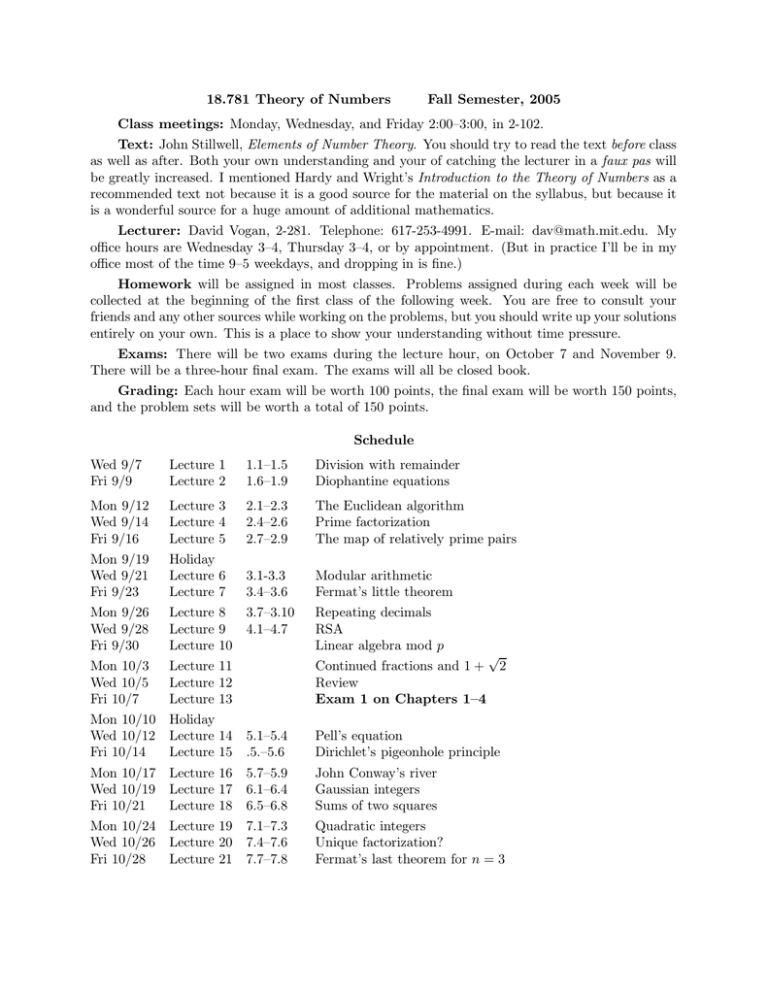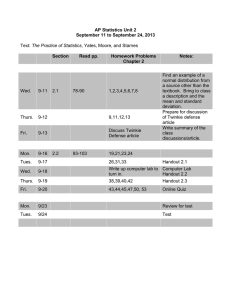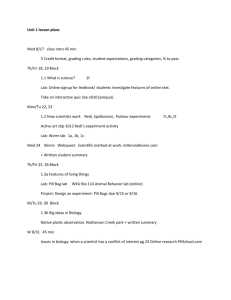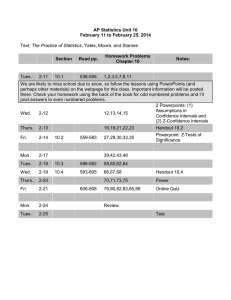18.781 Theory of Numbers Fall Semester, 2005 Class meetings:
advertisement

18.781 Theory of Numbers Fall Semester, 2005 Class meetings: Monday, Wednesday, and Friday 2:00–3:00, in 2-102. Text: John Stillwell, Elements of Number Theory. You should try to read the text before class as well as after. Both your own understanding and your of catching the lecturer in a faux pas will be greatly increased. I mentioned Hardy and Wright’s Introduction to the Theory of Numbers as a recommended text not because it is a good source for the material on the syllabus, but because it is a wonderful source for a huge amount of additional mathematics. Lecturer: David Vogan, 2-281. Telephone: 617-253-4991. E-mail: dav@math.mit.edu. My office hours are Wednesday 3–4, Thursday 3–4, or by appointment. (But in practice I’ll be in my office most of the time 9–5 weekdays, and dropping in is fine.) Homework will be assigned in most classes. Problems assigned during each week will be collected at the beginning of the first class of the following week. You are free to consult your friends and any other sources while working on the problems, but you should write up your solutions entirely on your own. This is a place to show your understanding without time pressure. Exams: There will be two exams during the lecture hour, on October 7 and November 9. There will be a three-hour final exam. The exams will all be closed book. Grading: Each hour exam will be worth 100 points, the final exam will be worth 150 points, and the problem sets will be worth a total of 150 points. Schedule Wed 9/7 Fri 9/9 Lecture 1 Lecture 2 1.1–1.5 1.6–1.9 Division with remainder Diophantine equations Mon 9/12 Wed 9/14 Fri 9/16 Mon 9/19 Wed 9/21 Fri 9/23 Mon 9/26 Wed 9/28 Fri 9/30 Lecture 3 Lecture 4 Lecture 5 Holiday Lecture 6 Lecture 7 Lecture 8 Lecture 9 Lecture 10 2.1–2.3 2.4–2.6 2.7–2.9 The Euclidean algorithm Prime factorization The map of relatively prime pairs 3.1-3.3 3.4–3.6 3.7–3.10 4.1–4.7 Modular arithmetic Fermat’s little theorem Repeating decimals RSA Linear algebra mod p Mon 10/3 Wed 10/5 Fri 10/7 Mon 10/10 Wed 10/12 Fri 10/14 Lecture 11 Lecture 12 Lecture 13 Holiday Lecture 14 Lecture 15 5.1–5.4 .5.–5.6 Pell’s equation Dirichlet’s pigeonhole principle Mon 10/17 Wed 10/19 Fri 10/21 Mon 10/24 Wed 10/26 Fri 10/28 Lecture Lecture Lecture Lecture Lecture Lecture 5.7–5.9 6.1–6.4 6.5–6.8 7.1–7.3 7.4–7.6 7.7–7.8 John Conway’s river Gaussian integers Sums of two squares Quadratic integers Unique factorization? Fermat’s last theorem for n = 3 16 17 18 19 20 21 √ Continued fractions and 1 + 2 Review Exam 1 on Chapters 1–4 Mon 10/31 Wed 11/2 Fri 11/4 Mon 11/7 Wed 11/9 Fri 11/11 Mon 11/14 Wed 11/16 Fri 11/18 Lecture 22 Lecture 23 Lecture 24 Lecture 25 Lecture 26 Holiday Lecture 27 Lecture 28 Lecture 29 8.1–8.3 8.4–8.6 8.7–8.9 Quaternions Hurwitz integers Sums of four squares Review Exam 2 on Chapters 1–8 9.1–9.2 9.3–9.5 9.6–9.7 Quadratic reciprocity Integer square roots of two Chinese remainder theorem Mon 11/21 Wed 11/23 Fri 11/25 Mon 11/28 Wed 11/30 Fri 12/2 Lecture 30 Lecture 31 Holiday Lecture 32 Lecture 33 Lecture 34 9.8–9.9 Proof of quadratic reciprocity Hundreds of other proofs 10.1–10.3 10.4–10.6 11.1–11.3 Rings Algebraic integers Ideals and divisibility Mon 12/5 Wed 12/7 Fri 12/9 Mon 12/12 Wed 12/14 Lecture Lecture Lecture Lecture Lecture 11.4–11.6 11.7–11.9 12.1–12.3 12.4–12.6 12.7–12.9 Non-principal ideals What is ideal factorization? Prime ideals Ideal factorization works Ideal classes week of 12/15–12/19 35 36 37 38 39 Final Exam








